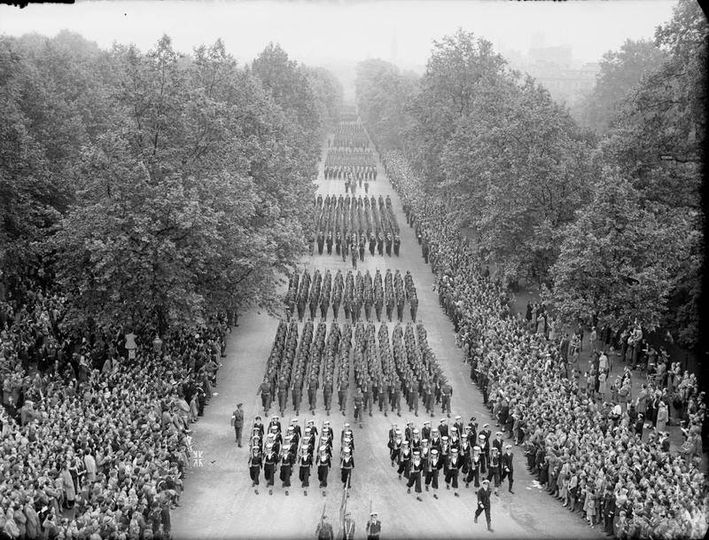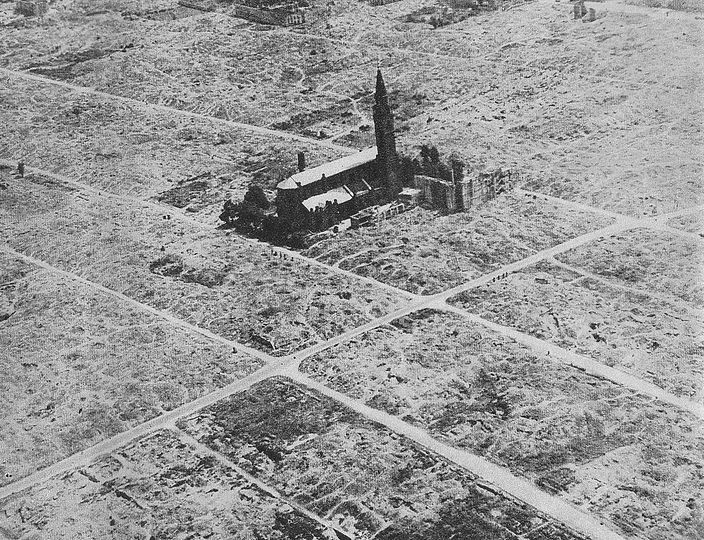The signing of the surrender by representatives of the Third Reich took place on 7 May 1945 in Reims. However, due to unfulfilled Soviet ambitions, this ceremony was repeated on 8 May in Berlin. The Soviet Union did not recognise the date of 8 May; Joseph Stalin wanted the date set by the Moscow time zone, 9 May, to apply. This was the narrative imposed on all countries within the Soviet sphere of influence.
The Polish perspective
The signing of the act of surrender by Germany on 8 May 1945 did not end the armed effort of the Poles. In the summer of 1945, the members of the Council of National Unity (the underground parliament), decided to dissolve the Council, stating "The end of the war with Germany found Poland in an incredibly difficult and even tragic situation. While other nations, especially in the West, regained real freedom after the end of the German occupation and were able to set about organising their own lives, Poland, as a result of the war in which it suffered the greatest sacrifices, found itself under occupation with a government imposed by a neighbouring state."
In August 1945, the Commander-in-Chief and the Government of the Republic of Poland in Exile emphasised, "We assess the present reality in Poland as Soviet occupation, which curtails the independence of the Polish Nation." The stance of the leadership of the "Freedom and Independence" Association was unequivocal, "There has been a change of occupant and circumstances, but our struggle has not ceased and will not cease until it is brought to an end by a final, complete victory."
Refusing to accept subjugation, some 200,000 Poles participated in the pro-independence resistance movement against the new authorities backed by Soviet bayonets. The most intense fighting, involving more than 20,000 soldiers grouped in partisan units, took place in the late 1940s and early 1950s. Fighting by smaller partisan groups continued. Resistance, not just armed resistance, was widespread and can be compared to the national uprisings of the 19th century and, in terms of scale, to the January Uprising.
The London Victory Celebrations of 1946, held on 8 June, to celebrate victory over Germany and Japan in the Second World War remained a bitter memory for the Poles. The British did not want representatives of the army and naval forces forming part of the Polish Armed Forces, which was one of the most numerous national formations fighting against Nazi Germany, to participate in the parade. Thus, the sacrifice of Polish soldiers on the altar of Europe's freedom was passed over in silence by the Western allies.
The Russian perspective
The martyrology of the Great Patriotic War (1941–1945) and the sacred, messianic myth of Victory (spelt with a capital letter) over German Nazism in 1945 formed the centre of Soviet ideology and state mythology. The celebrations held in Moscow, the centrepiece of which was the throwing of German banners at Stalin's feet, defined the Soviet perception of the day. The Soviet Union portrayed itself as the only force that physically crushed the Third Reich. A national myth was built around this, truly uniting Russians. It was later frequently used by the authorities.
The myth survived the collapse of the Soviet Union and became the most important public holiday of the Russian Federation, uniting Russians. Vladimir Putin put it bluntly on the 69th anniversary of the surrender of the Third Reich, "The iron will of the Soviet people, their courage and perseverance saved Europe from subjugation [...] Victory Day has always been, is and will be Russia's main holiday, a day of national triumph and pride."
The Kremlin leadership forgets that Stalin's actual goal was not the 'liberation' of Central and Eastern Europe but its conquest. The task of the Red Army and the NKVD troops was to eliminate the sovereign power in the occupied territories and install a usurper communist administration, entirely dependent on the Kremlin.
The scale of Soviet crimes committed after 1944 in the subjugated and incorporated Baltic states and Poland (deprived of almost half of its pre-war territory), Bulgaria, Czechoslovakia, Romania, Hungary or the region of what later became East Germany, as well as the brutal occupation of part of Austria, put the 'Soviet people' not in the role of liberators and defenders of Europe but its new occupiers and oppressors.
Many Central and Eastern European nations were formally in the victorious camp, but this victory did not bring them freedom. The former German camps soon filled up once again. The Soviets or native communists were now the ones who stood in the watchtowers. The Soviets did not save Europe but brought it half a century of totalitarianism.
Russia's usurping the role of the sole victor in the Second World War over Germany is now being used instrumentally to point out who the mythical 'Nazi' is. This mechanism has recently been used to justify Russia's aggression against Ukraine, called a fascist state by Vladimir Putin. Now other countries supporting the resistance of the Ukrainians are also being included in the 'Nazi camp' by Russia.
Facts versus myths
The differences between the Polish and Russian perception of the Second World War are far greater. For us, this conflict broke out on 1 September 1939, and for the Russians on 22 June 1941. We see the USSR as the aggressor that attacked Poland on 17 September; the Russians see themselves as the victims of German aggression. For them, 9 May 1945 is the day of victory and, for the Poles, the symbol of yet another subjugation.
It is important that we can now celebrate the end of the Second World War in a free, sovereign and safe Poland.

